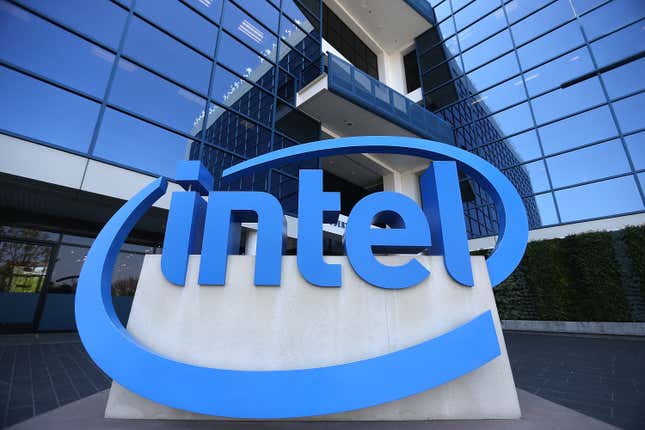
Intel unveiled its latest AI hardware Tuesday, saying it has better performance and efficiency for training generative artificial intelligence models than industry alternatives — even Nvidia’s highly sought after chip.
The semiconductor pioneer introduced its Gaudi 3 AI accelerator at the Intel Vision 2024 conference in Phoenix. Compared to its predecessor, the Gaudi 2 AI accelerator, Intel said Gaudi 3 has more AI computing power, networking bandwidth, and memory bandwidth to scale up AI training and inference on the so-called large language models (LLMs) that power AI chatbots like ChatGPT. Intel said the accelerator will also improve training and inference on multimodal AI models, which can process and understand multiple types of information including images and audio.
The Gaudi 3 AI accelerator was built to increase the speed and efficiency of parallel AI operations. Intel said it can also support multiple types of data and is projected to be 50% faster at training top LLMs than Nvidia’s popular $40,000 H100 chip, and provide 30% faster inferencing for top LLMs compared to Nvidia’s H200 chip. Inferencing refers to the process by which an AI model makes predictions using data it was trained on. The company said it is waiting for Nvidia to publish performance results for its newly unveiled Blackwell chip before it can compare it with Gaudi 3.
“Innovation is advancing at an unprecedented pace, all enabled by silicon — and every company is quickly becoming an AI company,” Intel CEO Pat Gelsinger said in a statement. “Intel is bringing AI everywhere across the enterprise from the PC to the data center to the edge.”
With improved memory capacity, fewer Gaudi 3 accelerators are needed to process datasets from larger AI models, improving cost efficiency for data centers, Intel said.
Read more: Google’s new chips look to challenge Nvidia, Microsoft and Amazon
Intel last month received $8.5 billion in direct government funding from the CHIPS and Science Act, part of its five-year, $100 billion plan to expand chipmaking in the U.S. Gelsinger said the company wants to build “the largest AI chip manufacturing site in the world” on empty land near Columbus, Ohio — one of the four states where it’s investing for the expansion. The company is also eligible for up to $11 billion in federal loans.
During his keynote address Tuesday at Intel Vision, Gelsinger said the company is committed to becoming the world’s No. 2 AI systems foundry by the end of the decade.
Intel said its Gaudi 3 accelerator is tackling the gap in hardware offerings in the AI market, where its customers are asking for choice — specifically amidst a shortage of Nvidia’s chips.
“If you look at the Gaudi 3 customers today, we see this growing momentum in the industry of our partners, our solutions, and customers who are now saying, ‘Man, this thing is great,’” Gelsinger said.
Bosch, LandingAI, and Seekr are some of Intel’s Gaudi accelerator customers, the company said.
Gaudi 3 will be available to equipment manufacturers including Dell, HPE, Lenovo, and Supermicro in the second quarter of this year, and is expected to be more widely available later this year, Intel said.
Gaudi 3 and Intel’s other new products and services, Gelsinger said, “are delivering a cohesive set of flexible solutions tailored to meet the changing needs of our customers and capitalize on the immense opportunities ahead.”
Gelsinger said later during a call with reporters that Intel has a “roadmap of innovation.” It includes ramping up its Gaudi 3 accelerator with customers and business partners this quarter, as well as its next-generation Falcon Shores supercomputing chip, as it competes with Nvidia’s product releases.
“Clearly Gaudi 3 well outperforms H100 today,” Gelsinger said, adding that TCO, or total cost of ownership, “is a huge differentiator” between the two chipmakers.
While Gelsinger declined to share details of Gaudi 3’s pricing, he said Intel is “very comfortable saying we are going to be well below the price points that have been quoted for H100s and Blackwell.”
Christoph Schell, Intel’s chief commercial officer, told reporters the question of Intel’s competition with Nvidia is not only about performance, but about cost, availability, and access to data.
“We tick the box on every single one of them,” Schell said, “way ahead of Nvidia.”